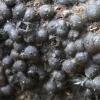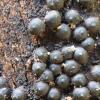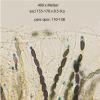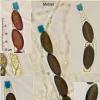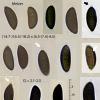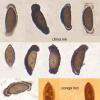
27-02-2026 17:51
 Michel Hairaud
Michel Hairaud
Bonjour, Quelqu'un peut il me donner un conseil p

28-02-2026 14:43
A new refrence desired :Svanidze, T.V. (1984) Novy

29-11-2024 21:47
Yanick BOULANGERBonjourJ'avais un deuxième échantillon moins mat

27-02-2026 16:17
 Mathias Hass
Mathias Hass
Hi, Found this on Betula, rather fresh fallen twi

27-02-2026 12:56
Åge OterhalsFound on fallen cones of Pinus sylvestris in midle

27-02-2026 11:21
 Yannick Mourgues
Yannick Mourgues
Hi to all. Here is a specie that can may be relat
Our common friend P. Zapico has found at his home these gregarious, blackish, roundish, papillate and ostiolate, carbonaceous, perithecia 0.9-1.4 mm in diam. growing over on more or less persistent subiculum on very rotten wood of a cut Salix babylonica.
The asci are cylindrical, 8-spored, 155-170 x 8.5-9 microns, pars sporifera 110-138 with a conspicuous apical apparatus Melzer deep blue 5-6 x 4 micr.
The ascospores are ellipsoid, equilateral, brownish at maturity, with straight germ slit nearly as long as spore, situated on the more convex side, and 1(-2) semiglobose cellular appendage (-s) surrounded by a partial, narrow slimy sheath. (14.7-)16.3(-18.2) x (6.5-)7.0(-8.0); Q = 2.1-2.5
I feel this fungus could be near to Rosellinia akulovii L.E. Petrini but I'd like to know your opinion.
Many thanks in advance for your help

it's good to hear from you and Pedro!
The overall morphology and the ascospores with cellular appendages and germ slit on the convex side clearly set this Rosellinia in the aquila-corticium group. Based on ascospores and apical apparatus dimensions and sheath morphology I would call it R. aquila, even though the ascospores are a bit small. I have seen a wide range of variations in this species, from small-spored collections like yours to large-spored ones grading into R. corticium. They might represent different species but they are difficult to separate based on morphology only.
I do not know R. akulovii for comparison.
Sorry Enrique, I guess you are not going to like my answer!
Cheers,
Jacques
Hi Jacques
No. I like very much your expert opinion on this very difficult genus, at least for me.
Many thanks, Jacques!
